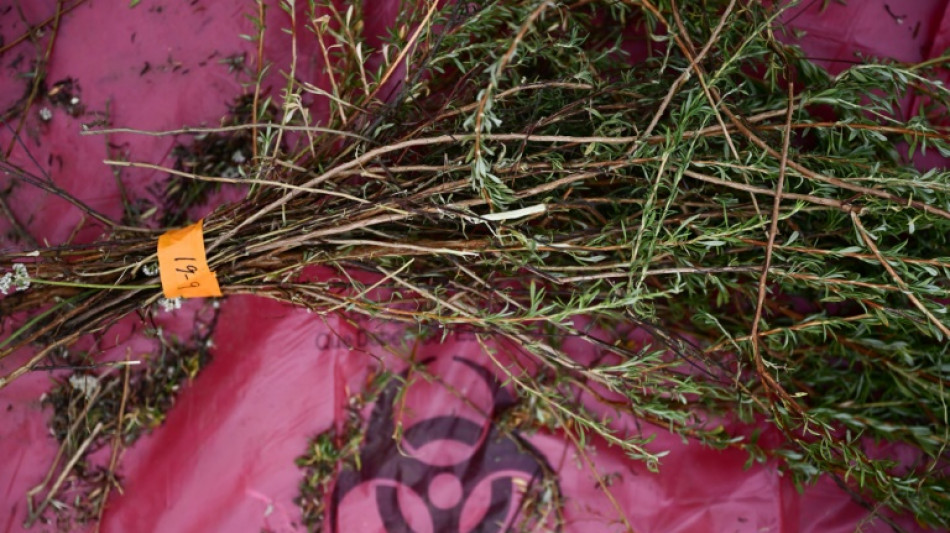
-
 Deadly storm sparks floods in Spain, disrupts Portugal vote
Deadly storm sparks floods in Spain, disrupts Portugal vote
-
Ukrainian flag bearer proud to show his country is still standing

-
 Carney scraps Canada EV sales mandate
Carney scraps Canada EV sales mandate
-
Morocco says evacuated 140,000 people due to severe weather

-
 Spurs boss Frank says Romero outburst 'dealt with internally'
Spurs boss Frank says Romero outburst 'dealt with internally'
-
Giannis suitors make deals as NBA trade deadline nears

-
 Carrick stresses significance of Munich air disaster to Man Utd history
Carrick stresses significance of Munich air disaster to Man Utd history
-
Record January window for transfers despite drop in spending

-
 'Burned inside their houses': Nigerians recount horror of massacre
'Burned inside their houses': Nigerians recount horror of massacre
-
Iran, US prepare for Oman talks after deadly protest crackdown

-
 Winter Olympics opening ceremony nears as virus disrupts ice hockey
Winter Olympics opening ceremony nears as virus disrupts ice hockey
-
Mining giant Rio Tinto abandons Glencore merger bid

-
 Davos forum opens probe into CEO Brende's Epstein links
Davos forum opens probe into CEO Brende's Epstein links
-
ECB warns of stronger euro impact, holds rates

-
 Famine spreading in Sudan's Darfur, warn UN-backed experts
Famine spreading in Sudan's Darfur, warn UN-backed experts
-
Lights back on in eastern Cuba after widespread blackout

-
 Russia, US agree to resume military contacts at Ukraine talks
Russia, US agree to resume military contacts at Ukraine talks
-
Greece aims to cut queues at ancient sites with new portal

-
 No time frame to get Palmer in 'perfect' shape - Rosenior
No time frame to get Palmer in 'perfect' shape - Rosenior
-
Stocks fall as tech valuation fears stoke volatility

-
 US Olympic body backs LA28 leadership amid Wasserman scandal
US Olympic body backs LA28 leadership amid Wasserman scandal
-
Gnabry extends Bayern Munich deal until 2028

-
 England captain Stokes suffers facial injury after being hit by ball
England captain Stokes suffers facial injury after being hit by ball
-
Italy captain Lamaro amongst trio set for 50th caps against Scotland

-
 Piastri plays down McLaren rivalry with champion Norris
Piastri plays down McLaren rivalry with champion Norris
-
ECB holds interest rates as strong euro causes jitters

-
 Spain, Portugal face floods and chaos after deadly new storm
Spain, Portugal face floods and chaos after deadly new storm
-
EU close to sealing trade deal with Australia

-
 German Cup final to stay in Berlin until 2030
German Cup final to stay in Berlin until 2030
-
What does Iran want from talks with the US?

-
 Taming the lion: Olympians take on Bormio's terrifying Stelvio piste
Taming the lion: Olympians take on Bormio's terrifying Stelvio piste
-
Wind turbine maker Vestas sees record revenue in 2025

-
 Italy's Casse tops second Olympic downhill training
Italy's Casse tops second Olympic downhill training
-
Anti-doping boss 'uncomfortable' with Valieva's coach at Olympics

-
 Bitcoin under $70,000 for first time since Trump's election
Bitcoin under $70,000 for first time since Trump's election
-
'I am sorry,' embattled UK PM tells Epstein victims

-
 England's Brook predicts record 300-plus scores at T20 World Cup
England's Brook predicts record 300-plus scores at T20 World Cup
-
Ukraine, Russia swap prisoners, US says 'work remains' to end war

-
 Wales' Rees-Zammit at full-back for Six Nations return against England
Wales' Rees-Zammit at full-back for Six Nations return against England
-
Sad horses and Draco Malfoy: China's unexpected Lunar New Year trends

-
 Hong Kong students dissolve pro-democracy group under 'severe' pressure
Hong Kong students dissolve pro-democracy group under 'severe' pressure
-
Germany claws back 59 mn euros from Amazon over price controls

-
 Germany claws back 70 mn euros from Amazon over price controls
Germany claws back 70 mn euros from Amazon over price controls
-
VW and Stellantis urge help to keep carmaking in Europe

-
 Stock markets drop amid tech concerns before rate calls
Stock markets drop amid tech concerns before rate calls
-
BBVA posts record profit after failed Sabadell takeover

-
 UN human rights agency in 'survival mode': chief
UN human rights agency in 'survival mode': chief
-
Greenpeace slams fossil fuel sponsors for Winter Olympics

-
 Greenpeace slams fossel fuel sponsors for Winter Olympics
Greenpeace slams fossel fuel sponsors for Winter Olympics
-
Kinghorn, Van der Merwe dropped by Scotland for Six Nations opener

| CMSC | -0.17% | 23.48 | $ | |
| SCS | 0.12% | 16.14 | $ | |
| NGG | -0.71% | 87.17 | $ | |
| RBGPF | 0.12% | 82.5 | $ | |
| RYCEF | -0.36% | 16.62 | $ | |
| RIO | -4.49% | 92.335 | $ | |
| CMSD | 0.21% | 23.92 | $ | |
| GSK | 3.44% | 59.27 | $ | |
| BTI | 0.61% | 62.01 | $ | |
| BCE | -4.2% | 25.279 | $ | |
| RELX | 0.73% | 30 | $ | |
| BCC | -2.52% | 88.01 | $ | |
| VOD | -6.98% | 14.685 | $ | |
| AZN | 0.78% | 188.92 | $ | |
| BP | -2.42% | 38.275 | $ | |
| JRI | 0.3% | 13.19 | $ |

Fungi and plants clean up California pollution
In an industrial wasteland in Los Angeles, Kreigh Hampel is uprooting California buckwheat with a pitchfork to find out how much lead it has absorbed.
The plant's delicate white and pink flowers belie an astonishing cleaning power, which scientists think could be harnessed to get rid of dangerous pollutants -- and even recycle them.
"That's the miracle of life," enthuses 68-year-old Hampel, who is volunteering on the project.
"Plants really can do this work and they know how to do it, they've done it so many times over millions of years," he says.
The experiment is part of a project run by University of California Riverside which has scattered carefully selected plants and fungi on this former industrial site in the hope of getting rid of the heavy metals and petrochemicals that have contaminated the area for decades.
Danielle Stevenson, who is leading the study, says such bioremediation techniques can be much more cost-effective than traditional techniques.
"The conventional method of cleaning up sites is just to dig up all the contaminated soil and to dump it somewhere else," she told AFP.
"That approach doesn't actually solve the problem, right? It just moves it somewhere else." And, she says, it costs a lot of money.
Stevenson's project, which is being carried out on three sites in and around Los Angeles, has a price tag of around $200,000 and so far is showing very promising results.
- Solar-powered vacuum cleaners -
"In three months, we had a 50 percent reduction of the petrochemicals and then in six months, we were getting pretty close (to that level) with some of the metals," she said.
Stevenson, a mycologist by training, has chosen her anti-pollution weapons with care.
Oyster mushrooms have been incorporated into the soil because of their natural role in decomposition: Their underground part, called the mycelium, is sucking up diesel.
"Those same fungi that in nature would eat a dead tree will also recognize diesel oil, for example, as a food source.
"The reason is, it's basically the same thing. A lot of our fossil fuels are just dead stuff that got compressed over long periods of time."
Several California native plants, including the telegraph weed and the California bush sunflower, are particularly good at absorbing heavy metals.
Stevenson thinks of the plants essentially as "solar powered vacuum cleaners: They basically suck up the metals, like lead, into their bodies.
"When we pull out the plants, we've removed the lead from the soil."
The lead and other metals can then be recovered from those plants -- and even reused.
Throughout the United States and the industrialized world, commercial sites that outlive their useful life to the companies that pollute them are often just abandoned, says Stevenson.
The responsibility to put them right falls on poorly funded or ill-equipped local authorities, who struggle to find the money or the expertise.
Historically the problem is worse in working class or ethnic minority neighborhoods, where politicians feel more able to ignore complaints.
In the United States, where the Environmental Protection Agency lists nearly 1,900 problem sites, only a small number of clean-up projects are carried out each year, Stevenson says.
She hopes that a cheaper method will enable more sites to be cleaned up.
- 'The Last of Us' -
Advocates say bioremediation's uses are not limited to fixing former industrial sites. The process can also be used to help clean up the toxic ash left by some wildfires -- an annual problem in fire-prone California.
So why is this technique still so underdeveloped?
"Bioremediation is still considered risky," explains Bill Mohn, professor of microbiology at the University of British Columbia in Canada.
Unlike soil excavation, "it's hard to guarantee that you will systematically reach the level of pollutants that are required.
"Whereas, we know that if you dig up the soil and send it to somebody who will take it if you pay them, then you've solved your problem."
Stevenson, meanwhile, points to unhealthy prejudices about mushrooms -- think of the terrifying fungi that infect the zombies of the HBO smash series "The Last of Us."
"I get asked all the time: 'If you introduce a fungus to clean up a site, is it going to take over, eat our house and take over the world?'" she says.
It won't, she is quick to add.
But that is why it is important to be conducting this kind of experiment in a real-world setting, not just in a laboratory.
"I think once we get more field tests of these methods, people will feel more confident choosing some of these approaches," she says.
I.Yassin--SF-PST


